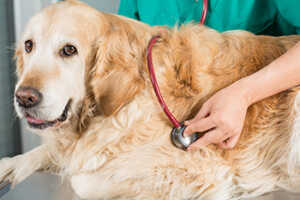Golden retrievers are one of the most beloved dog breeds in the United States and around the world.
While they are friendly, intelligent, and loyal dogs, they can be prone to some significant health issues.
One of the most concerning among them, as with all dog breeds, is cancer.
But why do golden retrievers get cancer, and is there anything that pet parents can do to try and protect dogs from this harrowing illness?
Read on to learn more. I’ll go over what makes golden retrievers so prone to certain cancers and what you should do to keep your golden happy, healthy, and cancer-free.
Golden Retrievers And Cancer
Cancer is a very common health condition among golden retrievers.
Estimates suggest that around 60% of golden retrievers develop cancer, which is about twice the rate seen in other dog breeds.
It is clear that this is related to a genetic predisposition to developing cancer, but exactly which genes are responsible for the susceptibility is unclear.
The main reason why problematic gene is so common among golden retrievers comes down to the founder effect.
Like all purebred dog breeds, golden retrievers come from a small group of dogs that were bred continuously until the breed eventually spread.
But while there are now hundreds of thousands of golden retrievers across the globe, they all come from this small genetic pool.
The genetic predisposition most likely existed within the small founder pool and therefore has been replicated and passed down over many, many generations.
This founder effect is seen in many dog breeds due to their limited gene pools, which is why many pure dog breeds are prone to certain health issues.
It is also seen in small and isolated human populations.
Breeding this genetic issue out of golden retrievers is not an easy task for two reasons. Firstly, the responsible genes have not yet been identified.
Also, it can be impossible to tell if these genes affect other aspects of the dog’s appearance and personality.
For example, breeders identified the gene in Dalmatians that makes them prone to kidney stones.
But when they started to control for the gene, they found it had an adverse effect on the appearance of the Dalmation’s spots.
Read about other common health conditions that affect golden retrievers.
What Types Of Cancer Do Golden Retrievers Get?
Golden retrievers are mainly susceptible to four types of cancer: hemangiosarcoma, lymphoma, mast cell tumors, and osteosarcoma.
Goldens in the United States are particularly prone to hemangiosarcoma, while goldens in the UK are more likely to be affected by lymphoma.
Below, I’ll break down each of these types of cancers and what you should know about them.
Hemangiosarcoma
Hemangiosarcoma is a cancer that attacks the circulatory system.
It can form a bleeding tumor that is usually found in the heart of the spleen, but it can also be found in other organs.
The tumor can break open unexpectedly and result in serious internal bleeding.
Lymphoma
Lymphome is a cancer of the white blood cells, which are an important part of the immune system.
There are various different types of lymphoma, and they can vary significantly in severity.
Mast Cell Tumor
Mast cell tumors are a form of skin cancer. They look like a fatty mass or a nasty lesion on the skin.
They can be hard to see when they are covered by hair and are often initially mistaken for sores or insect bites.
Osteosarcoma
Osteosarcoma is a cancer in the bones that is highly aggressive and affects several large dog breeds.
It usually starts in the bones in the limbs and then can move to the skull, spine, or ribcage.
The cancer has also been known to spread to the mammary glands and muscles. This cancer is very painful for dogs and can spread quickly.
Fortunately, about 50% of these cancers are treatable if they are detected early.
Can You Prevent Cancer In Your Golden Retriever?
Responsible breeders are now trying to breed mostly from goldens that have not been affected by cancer to limit the possibility of the disease.
The breeder we’ve worked with in the past has tried to reduce the possibility of cancer by breeding American Golden Retrievers with English Golden Retrievers.
Cancer is one of the main things you should look for when examining the medical records of the parents of a puppy you would like to adopt.
Of course, you may already have a golden or still adopt one with the genetic predisposition.
But while they inherit a genetic predisposition, they do not inherit cancer, and you can try and limit their likelihood of developing cancer by controlling environmental factors that trigger the illness.
The main cancer triggers that you are likely to be able to protect your dog from are sun exposure and chemical exposure.
Dogs develop skin cancer in the same way as humans: from excessive sun exposure. Be aware that your dog’s skin can be affected by the sun despite their thick, healthy coat.
Limit your dog’s sun exposure, ensuring they always have access to shade. You can also invest in doggy sunscreen for vulnerable parts of their body like their nose.
Chemical exposure can come in a variety of forms, but they are most likely to encounter pesticides and artificial additives in their foods.
Make sure you don’t use pesticides on your lawn and avoid places where you know that pesticides are used.
Choose dog foods that do not contain artificial colors, flavorings, or preservatives.
Read our guide to high quality and practical foods for golden retrievers.
Notably, environment seems to be a major factor in golden retrievers developing cancer, as the incidence of cancer among goldens has been increasing, resulting in a reduced overall lifespan.
In the 1970s, golden retrievers had a lifespan of 16 to 17 years, but now it has dropped to 10 to 14 years.
Our childhood family dog, Kiko was a Golden Retriever. Born in 1973, she only lived for 10 years passing away from…you guessed it, the big C, Cancer!
Of course, even with these precautions, your golden retriever may still develop cancer. It can also happen internally just in the natural splitting and replication of cells.
For this reason, it is important to always monitor your dog’s appearance and behavior.
Changes in their way they look or act can often be a sign that something is wrong.
Even if they don’t have cancer, the issue might be something else needing treatment, so it is always worth a visit to the vet.
The main symptoms associated with cancer include:
- A reduced appetite, even when tempted with their favorite foods
- Unexplained weight loss even when they seem to be eating normally
- Lethargy and decreased energy
- Pale gums
- Excessive panting
- An enlarged abdomen that seems to cause them pain or discomfort
These are early signs that can help you seek early treatment. In the later stages, you may see blood in their stool, disorientation, and collapse.
One of our family friends is a die hard Golden Retriever fan. They’ve had multiple Golden Retriever over the years.
Unfortunately, their last two Goldens passed away from cancer. They lost one at 6 years old and the second at 5 years old.
Heartbroken they haven’t gotten another dog in over 10 years 🙁
FAQs
How likely is it for a golden retriever to get cancer?
Cancer is very common in golden retrievers, with around 60% developing cancer at some point. This is more than twice as often as in most other dog breeds.
How can I protect my golden retriever from cancer?
While some cancers “just happen,” others can be triggered by environmental factors.
Limit your golden’s sun exposure and exposure to chemicals, such as pesticides and artificial additives in food, to limit their likelihood to develop cancer.
What is the main cause of cancer in dogs?
Some dog breeds, especially golden retrievers, are predisposed to developing cancer because they share a gene pool that makes them susceptible.
This means they can have cancer easily triggered by exposure to cancer-causing factors such as excessive sun exposure and chemicals.
What type of cancer is most common in golden retrievers?
Lymphoma is the most common cancer in golden retrievers, though this is more common in goldens in the UK than the US.
Hemangiosarcoma is very common in goldens in the US.
What is the average lifespan of golden retrievers?
The average lifespan of golden retrievers is 10 to 14 years.
This is a reduction from previous years. In the 1970s, goldens had an average lifespan of 16 to 17 years.
How do I know if my golden retriever has cancer?
There are many symptoms your dog will display if they have cancer.
Among common symptoms are loss of appetite and weight loss, lethargy and difficulty exercising, pale gums, panting, and a distended belly.
Final Thoughts
We love our golden retrievers, and we want them to be with us for a long time.
But sadly, more than half of all goldens will be affected by cancer at some point in their lives.
About half of all cancers in golden retrievers can be treated if detected early, but since our dogs can’t tell us when something is wrong, this can be a challenge.
Always monitor your dog’s appearance and behavior, as changes in their normal look or equilibrium are often the first sign that something is not right.
This may not indicate cancer, but it can indicate a number of medical conditions that it is worth consulting your vet about.
Limit your golden retriever’s likelihood of developing cancer by limiting their sun exposure and limiting their exposure to harmful chemicals, especially pesticides and artificial additives in foods.
To recap, the main symptoms of cancer in golden retrievers and other dog breeds include:
- Loss of appetite
- Lethargy
- Pale gums
- Distended or bloated abdomen
- Excessive panting
There is no reason your golden retriever can’t live a long and happy life with you, even if they are predisposed to developing cancer.
Regular vet checkups, exercise, and a healthy diet are key!
Do you have or have you had a Golden Retriever?
Have you had any health issues with your Golden?
Tell us your story in the comment section below.







2 Comments
Vicki Dennewitz
We lost our Golden, Brutus, on March 22. He was the best dog ever. He had hemangiosarcoma. We are devastated. He was only 9. We took him to the vet in January because we found lumps and the vet checked them and said they were fatty tumors and his liver was enlarged. We got him a prescription and he seemed to be doing better. Then he didn’t want to eat on Wednesday and he loved to eat. We rushed him to the vet and he was bleeding internally. We lost another Golden at age 7 about 20 years ago. It’s so hard.
Toni DeMoss
Our Golden Retriever has been diagnosed with lymphoma a week ago. He is 9 years old. We adopted him from a rescue in 2014. He developed enlarged lymph nodes in multiple areas and had loss of appetite. We rushed him to the vet, they took cells from all the enlarged lymph nodes and confirmed lymphoma. Our hearts were broken. He is currently on steroids and CBD treatment which has improved his symptoms. We are not doing chemotherapy. He is finally eating and sleeping better now. Frequent urination and incontinence is the side effect from the steroids. We don’t know how much time we have left with our precious boy, but we will enjoy every moment with him.